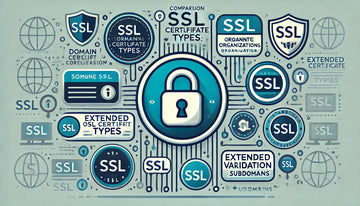In the world of e-commerce, trust is everything. With millions of online transactions occurring daily, customers need to feel confident that their personal and financial information is secure when shopping on a website. This is where Secure Sockets Layer (SSL) certificates come into play. SSL certificates encrypt data, ensuring that sensitive information, such as credit card details and personal identification, remains secure.
For e-commerce businesses, implementing SSL is not just a security measure—it's an essential trust-building tool that can significantly impact customer confidence and conversion rates. In this post, we’ll explore why SSL is so important for e-commerce, how it secures online transactions, and the benefits it provides for both businesses and customers.
What is SSL and How Does It Work?
SSL is a standard security protocol that encrypts data transmitted between a user's browser and the website’s server. This encryption ensures that any information exchanged—such as login credentials, payment details, or personal data—is protected from potential hackers and cyber threats. When SSL is enabled, the website’s URL begins with "HTTPS" (Hypertext Transfer Protocol Secure) instead of "HTTP," and a padlock icon appears in the address bar, signaling that the site is secure.
SSL works by creating a secure "handshake" between the browser and the server. Once the connection is established, any data transferred is encrypted using cryptographic keys, making it nearly impossible for third parties to intercept or decode the information.
Why SSL is Critical for E-commerce Websites
1. Protecting Customer Data
The primary reason e-commerce websites need SSL is to protect customer data. Online shoppers provide sensitive information when making purchases—such as credit card numbers, addresses, and phone numbers—and SSL ensures that this data is encrypted and kept private. Without SSL, this data could be intercepted by cybercriminals, leading to identity theft, fraud, or financial loss.
SSL encryption ensures that even if hackers manage to intercept the data, they won’t be able to read it. This level of protection is crucial for maintaining the security of your customers and your business.
2. Building Customer Trust
Trust is a key factor in the success of any e-commerce business. When customers see the HTTPS and padlock icon, they know that the website is secure. This visual cue reassures them that their data is protected, which encourages them to complete their purchases with confidence.
In contrast, websites without SSL may display "Not Secure" warnings in the browser’s address bar, which can deter potential customers from entering their information. These warnings signal that the website does not have the necessary security measures in place, creating a sense of distrust that can result in lost sales.
3. Preventing Fraud and Cyber Attacks
E-commerce websites are a prime target for cybercriminals due to the sensitive financial information they handle. One common type of attack is a "man-in-the-middle" attack, where hackers intercept data transmitted between the user and the server. Without SSL, these attacks are much easier to execute, putting both the customer and the business at risk.
By encrypting data, SSL protects against these attacks and prevents unauthorized access to sensitive information. For e-commerce businesses, this is a vital line of defense that can help safeguard their reputation and avoid costly breaches.
4. Improving SEO and Search Rankings
In addition to securing your website, SSL also provides SEO benefits. Google has made it clear that HTTPS is a ranking factor, meaning that websites with SSL certificates are more likely to rank higher in search engine results. This can give e-commerce websites a competitive edge, as higher rankings translate to more visibility and increased traffic.
Moreover, Google Chrome and other major browsers prioritize secure websites by displaying warnings for non-secure sites. These warnings can drive users away, further emphasizing the importance of SSL for both security and SEO purposes.
Benefits of SSL for E-commerce Businesses
1. Boosting Conversion Rates
SSL certificates can directly impact an e-commerce website’s conversion rates. When customers trust that their information is secure, they are more likely to complete their purchase. A study by the Baymard Institute found that security concerns are one of the leading reasons for cart abandonment, with 18% of respondents stating that they didn’t trust the site with their payment information.
By displaying the HTTPS and padlock icon, e-commerce businesses can reduce cart abandonment rates and increase conversions by reassuring customers that their data is safe.
2. Compliance with Industry Standards
For e-commerce businesses, especially those that handle credit card payments, compliance with industry standards like PCI DSS (Payment Card Industry Data Security Standard) is mandatory. One of the requirements of PCI DSS is the use of SSL/TLS encryption to secure sensitive payment data.
Without SSL, e-commerce websites risk non-compliance, which can result in fines, penalties, or even the inability to process payments. Implementing SSL is a simple way to meet this requirement and avoid these potential consequences.
3. Enhancing Brand Reputation
A secure website not only protects customer data but also enhances your brand’s reputation. Customers are more likely to trust and engage with a business that prioritizes their safety. In the event of a security breach, the damage to your reputation can be severe, leading to a loss of customers and long-term brand damage.
SSL helps businesses build a reputation for trustworthiness, which can lead to increased customer loyalty and repeat business. In a competitive e-commerce landscape, maintaining a positive brand image is critical to long-term success.
4. Enabling Secure Mobile Transactions
With the rise of mobile commerce, it’s more important than ever to secure mobile transactions. Many customers now shop from their smartphones and tablets, and SSL ensures that their data is protected across all devices. This not only improves the user experience but also ensures that e-commerce businesses are meeting the security expectations of modern consumers.
How to Implement SSL for Your E-commerce Website
1. Choose the Right SSL Certificate
There are several types of SSL certificates to choose from, depending on the needs of your e-commerce website:
- Domain Validated (DV): Basic level of encryption for smaller websites.
- Organization Validated (OV): Higher level of validation, often used by small to medium-sized businesses.
- Extended Validation (EV): The highest level of validation, offering a green address bar and maximum trust for customers.
For e-commerce sites, OV or EV certificates are recommended as they provide a higher level of validation and trust, especially for businesses handling sensitive payment data.
2. Install and Configure the SSL Certificate
Once you’ve chosen the right SSL certificate, it’s time to install it on your web server. Many hosting providers offer one-click SSL installation, but the process may vary depending on your provider. Make sure to configure the certificate correctly, ensuring that all pages and resources load over HTTPS.
3. Update Internal Links and Resources
After installing SSL, ensure that all internal links and resources on your website point to the HTTPS version. Failing to do so can result in "mixed content" warnings, where secure pages attempt to load insecure elements like images or scripts. This can undermine the security of your site and confuse customers.
4. Set Up 301 Redirects
To ensure that users and search engines are directed to the HTTPS version of your website, set up 301 redirects from HTTP to HTTPS. This will prevent any traffic from being sent to the non-secure version of your site.
Conclusion: SSL is a Must for E-commerce Success
In today’s digital age, SSL certificates are no longer optional for e-commerce websites—they are essential. SSL not only protects customer data but also builds trust, prevents fraud, and improves search engine rankings. For e-commerce businesses looking to stay competitive and maintain a positive brand reputation, SSL is a critical investment.
By implementing SSL, you can create a secure shopping environment that encourages customers to complete their transactions with confidence. In doing so, you'll build a loyal customer base and ensure long-term success in the fast-paced world of online commerce.














